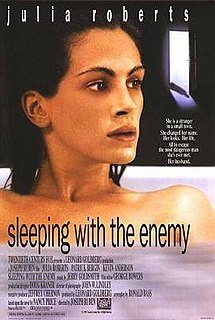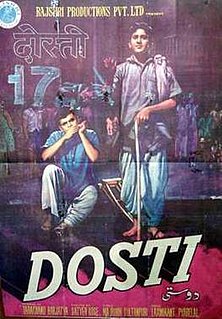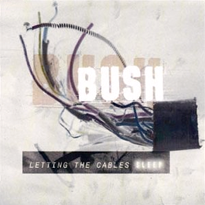
Sleeping Beauty, or Little Briar Rose, also titled in English as The Sleeping Beauty in the Woods, is a classic fairy tale about a princess who is cursed to sleep for a hundred years by an evil fairy, where she would be awakened by a handsome prince. When the good fairy hears this she knew that the princess would be frightened if she found herself alone when she wakes up, so the fairy uses her wand to put every living person and animal in the palace to sleep until the princess awakes.

"The Lion Sleeps Tonight" is a song originally written and recorded by Solomon Linda under the title "Mbube" for the South African Gallo Record Company in 1939. Linda's original was written in Zulu, while the English version's lyrics were written by George David Weiss. The song was adapted and covered internationally by many pop and folk revival artists in the 1950s and 1960s, including the Weavers, Jimmy Dorsey, Yma Sumac, Miriam Makeba, and the Kingston Trio. In 1961, it became a number one hit in the United States as adapted in English with the best-known version by the doo-wop group the Tokens. It went on to earn millions in royalties from cover versions and film licensing. The pop group Tight Fit had a number one hit in the UK with the song in 1982.

"To be, or not to be" is the opening phrase of a soliloquy uttered by Prince Hamlet in the so-called "nunnery scene" of William Shakespeare's play Hamlet, Act 3, Scene 1. In the speech, Hamlet contemplates death and suicide, bemoaning the pain and unfairness of life but acknowledging that the alternative might be worse. The opening line is one of the most widely known and quoted lines in modern English, and the soliloquy has been referenced in innumerable works of theatre, literature and music.
A nightmare is a frightening dream.

Sleeping with the Enemy is a 1991 American romantic psychological thriller film directed by Joseph Ruben and starring Julia Roberts, Patrick Bergin and Kevin Anderson. The film is based on Nancy Price's novel of the same name of 1987. Roberts plays a woman who escapes from her abusive husband, from Cape Cod to Cedar Falls, Iowa, where she captures the attention of a kindly college drama teacher.

Sleeping Beauty is a 1959 American animated musical fantasy film produced by Walt Disney based on Sleeping Beauty by Charles Perrault. The 16th Disney animated feature film, it was released to theaters on January 29, 1959, by Buena Vista Distribution. This was the last Disney adaptation of a fairy tale for some years because of its initial mixed critical reception and underperformance at the box office; the studio did not return to the genre until 30 years later, after Walt Disney died in 1966, with the release of The Little Mermaid (1989).

The National is an American rock band from Cincinnati, Ohio, formed in 1999. The band consists of Matt Berninger (vocals), Aaron Dessner, Bryce Dessner, Scott Devendorf (bass) and Bryan Devendorf (drums).
"Bibbidi-Bobbidi-Boo" is a novelty song, written in 1948 by Al Hoffman, Mack David, and Jerry Livingston. Introduced in the 1950 film Cinderella, and performed by actress Verna Felton, the song is about the Fairy Godmother transforming an orange pumpkin into a white carriage, four brown mice into white horses, a gray horse into a white-haired coachman, and a brown dog into a white-haired footman. The song was nominated for the Academy Award for Best Original Song in 1951 but lost out to "Mona Lisa" from Captain Carey, U.S.A. Disney used the song once again in their 2015 remake of Cinderella which starred Lily James in the leading role. The song was performed by Helena Bonham Carter, who plays Fairy Godmother, and was the final song of the movie, playing with the end credits. Bonham Carter's version can also be found as the 30th song on the original movie soundtrack.

Abhijeet Bhattacharya, better known as Abhijeet, is a Bollywood playback singer born to a Kanpur-based Bengali businessman turned editor Dhirendranath Bhattacharya, and his wife Kamladevi Bhattacharya in Kanpur, Uttar Pradesh. Abhijeet was the youngest among the four sons in the family. He married a fashion designer Sumati Bhattacharya in 1990 and has two sons Dhruv Abhijeet Bhattacharya and Jai Abhijeet Bhattacharya. Abhijeet Bhattacharya has sung 6034 songs in over 1000 films.

"Trouble Sleeping" is a song by English singer-songwriter Corinne Bailey Rae from her self-titled debut album (2006). It was written by Rae, John Beck and Steve Chrisanthou, and was released as the album's third single on 29 May 2006. Rae performed this song and "Like a Star" on the 27 November 2006 episode of the NBC comedy-drama series Studio 60 on the Sunset Strip. "Trouble Sleeping" was also featured on the NBC medical drama ER and on the CBS police procedural drama NCIS.

The Matrix Reloaded: The Album is a 2003 soundtrack album from the 2003 film The Matrix Reloaded. The two-disc album is unusual among soundtrack releases in that it includes separate discs for the film's songs and the score, whereas most films release the songs and the score as separate single-disc albums.

Dosti is a 1964 Indian black-and-white Hindi film directed by Satyen Bose and produced by Tarachand Barjatya under his Rajshri Productions banner. The film focuses on the dosti/friendship between two boys, one sight-impaired and the other physically-handicapped, played by Sudhir Kumar Sawant and Sushil Kumar Somaya; it was also an early film with Sanjay Khan. Dosti was amongst the top 10 grossers of 1964 and was declared a "Super Hit" at the box office. It was entered into the 4th Moscow International Film Festival. The film was remade in Malayalam and Telugu as Sneham.

They Go Boom is a 1929 short comedy film directed by James Parrott and starring Laurel and Hardy.

Terkel in Trouble or The Trouble with Terkel is a 2004 Danish computer animated adult-oriented musical dark comedy horror film. In the original Danish version, almost all the voices are done by stand-up comedian Anders Matthesen, who also wrote the original story – released on a CD. In the Norwegian version, all voices were performed by actor Aksel Hennie. For the UK version, multiple actors are used such as Bill Bailey and Toby Stephens.

"Black-Eyed" is a song by English alternative rock band Placebo. It was released as a single from their third studio album, 2000's Black Market Music. The song tells the story of a character with a troubled childhood, bitterly affecting their development: "I'm forever black-eyed/A product of a broken home".

"Letting the Cables Sleep" is the third and final single from British band Bush's third studio album The Science of Things, which was released in 1999. The song became a minor hit, and pushed the album to platinum status. The song was a bigger hit than its predecessor "Warm Machine", but not nearly as successful as the first single from the album, "The Chemicals Between Us." The song was featured in the film Goal II: Living the Dream and in the TV series ER, Charmed and Cold Case.

Aaron Brooking Dessner is an American songwriter, multi-instrumentalist and record producer. He is best known as a member of the rock band The National, and co-founder of Big Red Machine with Justin Vernon in 2016 based on a song they wrote of the same name for compilation Dark Was the Night in 2008. Dessner writes the majority of the music for The National, collaborating on songwriting with singer Matt Berninger.

Lost Song is a 2008 film by Canadian director Rodrigue Jean, his third long feature after Full Blast and Yellowknife. It won the Best Canadian Film Award at the Toronto International Film Festival.

Bridge over Troubled Water is the fifth and final studio album by American folk rock duo Simon & Garfunkel, released in January 1970 on Columbia Records. Following the duo's soundtrack for The Graduate, Art Garfunkel took an acting role in the film Catch-22, while Paul Simon worked on the songs, writing all tracks except Felice and Boudleaux Bryant's "Bye Bye Love".

"Trouble" is the first single from Shampoo's 1994 debut album We Are Shampoo. The song was the band's most successful single, reaching No. 11 in the UK and making the top 20 in Australia, Belgium, Finland and the Netherlands as well as number 37 in Canada. Attempting to break into the US market, the song was released as a promotional single for the 1995 film Mighty Morphin Power Rangers: The Movie, in anticipation of the release of the US version of We Are Shampoo. A new music video was recorded featuring clips from the Power Rangers film.

















